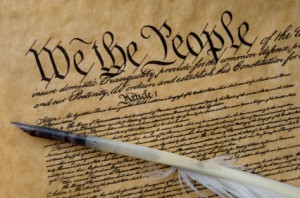By Doug Casey, Casey Research
Legendary contrarian investor and the original International Man Doug Casey takes aim at the US Constitution, from its sneaky beginnings to its encroachments on individual liberty and free markets.

Doug: Good idea. I confess I suspected this was coming up, so I just now read the Constitution again. This is actually something I recommend to everyone. Unfortunately, the Constitution is now a dead letter, but reading it is instructive in a number of ways, and it only takes about ten minutes. One should know the law of the land, even if it no longer applies.
That will probably be enough for one conversation, but we should probably also take up the amendments, especially the Bill of Rights, in a future conversation, and then maybe another on the Declaration of Independence – another short document everyone should read.
L: Well, some might argue that since the Constitution was ratified with the Bill of Rights attached, they really ought to be considered together, but I’d certainly agree that the later amendments – like the ones establishing and repealing Prohibition – should be a separate conversation.
Doug: Thank heaven for the Bill of Rights; it slowed the descent of the US considerably, while it was still taken seriously. So, where to begin…
L: How about with the fact that there wasn’t supposed to be a constitution? The Continental Congress authorized delegates to gather to amend and improve on the Articles of Confederation, not to replace them with a new form of government.
Doug: I’ve read that James Madison of Virginia showed up with a document called the “Virginia Plan,” bearing close resemblance to the current Constitution, except that it clearly described a single, national government. That didn’t sit too well with the more independent-minded delegates, so they struck the words “national government” and replaced them with “United States,” which went over a lot better.
Now, I wasn’t there – and the convention was held behind closed doors – so I hope readers will give me a little wiggle room if they read a book that tells a different story, but my impression has long been that the adoption of the Constitution was actually something of a coup. It replaced a confederation of separate governments with a single super-government. Many people didn’t realize this at the time, or they would have objected. The War Between the States demonstrated the reality of the matter, when people did object.
L: I think I’ve read the same books you have. Or maybe I’m just remembering our conversation on the Civil War.
Doug: People often gush about what a wonderful thing the Constitution is, but I’ve always suspected that US and world history would be different – and better – if those delegates had done as they were told and just smoothed over the rough spots in the Articles rather than replaced them with the Constitution. Greater independence among the states could have led to more innovation, and I doubt there would have been the unpleasantness of 1861-’65. People with differing ethical values and economic interests would not have been forced to obey the same laws.
L: Perhaps. But they did, and we’re stuck with the Constitution we have, for now.
Doug: For now. Sometimes I think those who’ve called for a new constitutional convention are on to something, because the one we have now has fallen into almost complete disuse. People talk as though it were carved into the sacred bedrock of the universe, but few people have actually read it, and most of those who have seem to spend their time trying to figure out ways to get out of the clear and simple rules it set out, rather than abide by it. People talk about how it should be a “living document” that evolves with the times. But those people almost always want to abolish what few limitations there are on the government. They want to change the actual working parts of the Constitution, the ones that define and shape the government, not the tedious pages with “Robert’s Rules of Order” type stuff governing how motions are passed in Congress and the like. Curiously, this trivia – about how the president of the Senate is elected and so forth – is the only part of the Constitution that the government still adheres to. It follows the trivia fastidiously but disregards the important parts that designate what the government may and may not do.
L: Ah, the irony. But a constitutional convention is a terrible idea, Doug; you know that if we had one now, we wouldn’t get anything like enumerated and restricted powers or the Bill of Rights. The average “educated” person in the US has been taught that the Great Depression proved that capitalism doesn’t work; and the average couch potato believes that work is a tedious imposition to be avoided, rather than a virtue. If a new constitution were drafted today, we’d get unlimited and expansive powers and a Bill of Entitlements.
Doug: [Sighs] You’re absolutely right. All institutions – countries, companies, clubs, whatever – inevitably degrade and become corrupt over time. That’s one reason why revolutions occur in countries.



